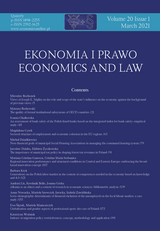REPRYWATYZACJA A KONFLIKT INTERESÓW EKONOMICZNYCH JEDNOSTEK i PAŃSTWA – POLSKA NA TLE POZOSTAŁYCH KRAJÓW TRANSFORMACJI
REPRIVATIZATION AND THE CONFLICT OF ECONOMIC INTERESTS OF INDIVIDUALS AND THE STATE. POLAND COMPARED TO OTHER COUNTRIES IN TRANSITION
Author(s): Anna Moszyńska, Michał MoszyńskiSubject(s): Civil Law, Public Law, Socio-Economic Research, Comparative Law
Published by: Wydawnictwo Naukowe Uniwersytetu Mikołaja Kopernika
Keywords: Re-privatization policy; conflict of economic interests; Individuals and the state; Poland; property restitution process;
Summary/Abstract: The aim of the study is a comparison of re-privatization policy pursued in Poland and other countries of Central and Eastern Europe, with particular emphasis on the former GDR. Poland has chosen a completely different approach to this issue from that of the Germans. Despite the claims of former owners concerned, in almost 2/3 of the former GDR territory, the German legislature quickly and decisively resolved these issues, so that they do not impinge on the current social and economic life of Germany. Poland however, after two decades of transformation, has still not developed a clear position on this issue, while successive legislation projects end in failure or are postponed indefinitely. This practice leads to doubt as to whether our country can be regarded as fully integrated with the West in terms of compliance with standards of the modern state, which resolves sensitive issues and seeks to eliminate hot spots in contacts with foreign countries (e.g. the return of former Jewish property). Reprivatization is important for several reasons, of both legal and economic nature. Lack of a solution raises a sense of injustice among former owners, generates numerous conflicts on the citizen-state line, and calls into question the constitutionally guaranteed protection of property rights in Poland. On the other hand, a thankless objective of an economist is to assess the economic aspects of a possible compensation program – could Poland afford it? What would be the costs of abandonment of any action? In the first part of the study the regulations on property restitution in the former Eastern bloc countries are shortly discussed. Then attention is paid to the legal and economic conditions of the property restitution process in Poland.
Journal: Ekonomia i Prawo. Economics and Law
- Issue Year: 8/2012
- Issue No: 1
- Page Range: 119-136
- Page Count: 18
- Language: Polish

